WIlderness Medicine Courses
TAKE YOUR WILDERNESS MEDICAL TRAINING TO THE NEXT LEVEL! As a climber or outdoors-person, you cannot afford to be untrained in Wilderness Medicine. Granite Arches offers in-house wilderness medicine courses. We offer courses in two ways. First, we offer standard wilderness medicine courses teaching the WFA, WAFA and WFR courses from Wilderness Medical Associates--one of the oldest and most respected wilderness medicine companies in the world. In addition, we offer our custom CLIME® course for additional directed wilderness medicine expertise for climbers. All of our medical courses are taught by an AMGA Rock Instructor that is a board certified emergency physician.
Wilderness First Aid (WFA) 16 hours
The best and most comprehensive course of its kind, offering relevant and realistic first-aid training for recreational climbers, seasonal outdoor activities or short term wilderness endeavors and pursuits.
Wilderness First Aid is a two-day introduction to general medical concepts and basic life support skills. It is targeted to the outdoor enthusiast on day trips or short adventures.
Course Content
The expected target audience is seasonal outdoor staff, recreational climbers, and those involved in recreational wilderness trips. The course content meets the anticipated medical needs of those communities. Course content includes:
- Patient Assessment System and CPR
- Circulatory System, Nervous System, Respiratory System
- Fractures, Stable Injuries, Extremity Splints
- Hypothermia, Hyperthermia and Heat Illness
- Near Drowning, Lightning Injuries and Wounds and Burns
- Anaphylaxis
- Lifting, Moving, Extrication, Patient Carries.
- Backcountry Medicine
Wilderness Advanced First Aid (WAFA) 32 hours
Wilderness Advanced First Aid is comprehensive medical training designed for assistant rock guides, remote professionals or wilderness leaders who venture into remote and challenging environments. Wilderness Medicine differs significantly from standard first aid courses and other training that are oriented toward urban environments. This course teaches how to manage medical emergencies when hospitals and rescue services may not be available for an extensive time period. We prepare students for emergency situations that involve prolonged patient care, severe environments, and improvised equipment.
Course Content
Day 1 - Introduction/Registration; Systems Based Critical Thinking; Infection Control; Patient Assessment System; Circulatory & Respiratory Systems; Adult CPR; Basic Life Support
Day 2 - Quiz/Case Studies; Nervous System, Spine Management; Musculoskeletal Injuries; Lifts, Moves, and Extrications; Splints - Extremities; Patient Assessment Drills
Day 3 - Quiz/Case Studies; Thermoregulation; Bites and Stings; Lightning; Elective Topics; Wounds and Burns; Allergies and Anaphylaxis; Improvised Patient Carries; Patient Assessment Drills
Day 4 - Case Study Review; Elective Topic; Backcountry Medicine; Medical and Legal Issues; Patient Assessment Drills; Simulations; Final Exam; Conclusion
Wilderness First Responder (WFR) 50+ hours
The definitive wilderness course in medical training, leadership, and critical thinking for outdoor, low-resource, and remote professionals and leaders. If you are or want to be a climbing guide, this course is for you. The curriculum is comprehensive and practical. It includes the essential principles and skills required to assess and manage medical problems in isolated and extreme environments for days and weeks if necessary.
Course Content
The Wilderness First Responder curriculum is written by a team of remote medical rescue researchers and professionals. Ongoing evidence based research and review contributes to a unique and innovative approach to patient care in backcountry and austere settings. The curriculum is comprehensive, complete, and kept current on an annual basis. This is the most current and cutting edge course of any first response medical training (urban or remote) in the world.
- The General Principles of Wilderness and Rescue Medicine with an emphasis on the prevention and identification of medical emergencies, appropriate technology, and risk management.
- Patient assessment and emergency care including CPR, basic Life support, and the emergency treatment of anaphylaxis and asthma.
- Environmental Medicine including altitude illness, hypothermia and heat illness, frostbite and cold injury, lightning, submersion, and environmental toxins.
- Backcountry Medicine including the assessment and treatment of common medical problems.
- Musculoskeletal Problems including unstable and stable injuries overuse syndromes, and dislocations.
- Wound management including open fractures, lacerations, burns and blisters.
- Practical skills including splinting, bandaging, litter packaging and medical kit preparation.
- WMA International Wilderness Protocols including wound cleaning and exploration, spine injury assessment, dislocation reduction, CPR in the remote setting, and anaphylaxis and asthma.
CLimber's Intervention for traumatic Medical Emergencies (CLIME©)
What do you do when you are at the local crag and the lead climber on the route next to you falls, pulling all of his/her gear, and lands with a thud? Would you know how to treat life or limb threatening injuries such as a head injury, a broken femur, an angulated arm fracture with nerve involvement, or a pneumothorax?
Course Content
This class is not a general wilderness medicine course. The CLIME© course will focus on traumatic injuries and other medical problems likely to occur in the climbing environment on a typical accident (e.g. head injuries, cervical spine injuries, blood loss, broken bones), with a focus on life and limb-threatening conditions. Learning to do a good trauma assessment, and the application of appropriate interventions will be the backbone of this course. It serves as an excellent stand-alone climber's course, or as an adjunct to WFA, WAFA, or WIFR training.
